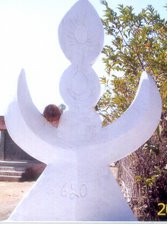Nimitz Returns to oblige Indian Comradors!
Palash BiswasContact: Palash C Biswas, C/O Mrs Arati Roy, GostoKanan, Sodepur, Kolkata- 700110, India. Phone:91-033-25659551Email: palashchandrabiswas@gmail.com
Thus Gayatri Mantra works for World Peace AmeriacanVersion!Nuclear-powered American aircraft carrier USS Nimitzto oblige Indian Comradors of Post Modern Manusmriti.SEZ drive, DOW`s entry with Union Carbide backdrop andNapam Bombs and US interests represented by MNCsinvesting in India for Capitalist Development highlights the Zionist Hindu Feudal Imperialist allaince just after Red Mosque Operation Silence inline with Operation Blue Star The gigantic nuclear-powered American aircraft carrier USS Nimitz, which left the Left parties fuming when it anchored near Chennai early this month, will be headed towards Indian waters once again in September.
The Communist Party of India (Marxist) on Friday opposed the proposed visit of the American nuclear-powered aircraft carrier USS Nimitz to the Bayof Bengal in the first week of September to participate in multination exercises. Communists as well as Centrist or Rightist political parties oppose US imperialism while the hidden agenda happens to be promoting it as it is mendatory for Brahminical SuperPower Sensex India!The Nimitz would be joined by another American aircraft carrier USS Kitty Hawk besides several other ships for what is billed as one of the biggest war games being hosted by the Indian Navy. However, the probability of its docking near any Indian port is“unlikely”, said Indian Navy sources. The anchoring of Nimitz off Chennai in the beginning of this month had led to protests by the Left Parties,AIADMK and unions.
“The significance of the visit of the USS Nimitz is that the UPA [United ProgressiveAlliance] government is step by step implementing thedefence framework agreement with the United Stateswhich will convert India into a military ally of theUnited States,” the CPI (M) had observed at that time.This led the Government to disclose the supervision and radiation measuring measures that had been put inplace. This would be the third visit near Indian shores by the carrier, which takes part in operations against Iraq.
On Thursday, for the first time in U.S. history, theUnited States Senate opened with a Hindu prayer. RajanZed, a U.S. citizen originally from India and chaplain of the Indian Association of Northern Nevada, was invited as a guest chaplain through the introductionof Senate Majority Leader Harry Reid. As during the long decades of the Cold War, the American goal in South Asia continues to be one of containing India while ostensibly becoming India's 'strategic'partner.US President George W Bush and Indian Prime Minister Manmohan Singh discussed teething problems related to the nuclear deal on Wednesday over the phone, and vowed to reinforce bilateral relations.
The discussion took place ahead of talks between the national security advisors of both countries nextweek.Both countries recently decided to upgrade negotiations from official to political levels to finalise the deal.
Sensing that the bureaucracy has failed to clear roadblocks, Bush and Singh have now entrusted negotiations to their national security advisors. India’s National Security Advisor M KNarayanan is scheduled to travel to Washington on July16 to meet his American counterpart, Stephen Hadley,with some fresh proposals.Fearing that the Indo-US civil nuclear deal will makeNew Delhi dependent on Washington for everything,former Prime Minister V P Singh on Thursday demandedthat Parliament's approval be made mandatory for all international agreements.
Ahead of the high-level Indo-US meeting in Washington on the nuclear issue,Singh said people needed to know about developments that affect generations as he insisted that the talkson the civil nuclear deal were shrouded in "secrecy". Russia suspended participation in a key European armscontrol treaty Saturday, saying it will halt NATOinspections of its military sites and no longer limitthe numbers of its tanks and other heavy conventionalweapons.
Meanwhile,India has taken the first steptowards developing a national plan to tackle the effects of global warming. Prime Minister ManmohanSingh’s new Council on Climate held its first meeting in a bid to come up with a national agenda. On theother hand, United National Progressive Alliance(UNPA) on Saturday decided to abstain from voting inthe July 19 Presidential polls and put up its owncandidate for the post of Vice President.Keeping upthe pressure on the industry to take concrete stepsfor SCs and STs by way of giving them preference inemployment, the Prime Minister's Office has convened ameeting on Saturday with heads of leading businesschambers on ...Zed ended his prayer with shanti, shanti shanti --peace, peace, peace -- bringing the Hindu wish forpeace to the heart of the U.S. capital.
After theprayer Reid stressed the importance of peace,especially with the ongoing international war onterror. He urged people to "think of Gandhi, a man whogave his life for peace." The historical decision to tender an officialinvitation to Rajan Zed to recite a prayer from theRig-Veda, the Upanishads and the Srimadbhagvad-Gitawas a wonderful act of acceptance and tolerance and astep toward true and healthy globalization.
This act is worth contemplating. It invites us to hold a mirrorto those in India who have a more narrow view, whoconsider themselves patrons of Hindus yet expressintolerance toward others, which is against thefundamentals of Hinduism. The character of these hymns and prayers is universal.They are devoted to the welfare of all, not restrictedto any particular human community or the followers ofany religious community. Still, the Vedas andUpanishads are the holy scriptures of the Hindureligious community. Their recitation in the halls ofgovernment of the United States is definitely a uniqueexample of religious acceptance, forbearance andtolerance. Another recent trend has also raised the profile ofIndians in the global community. This is the adoptionof thousands of Indian children, especially byoverseas Indian families living in the United Statesand the developed countries of Europe. According to astatement by the Indian government last month, 945Indian children were adopted in the past three yearsby families living in the United States. Over the sameperiod, from 2004-2007, 419 children were adopted byfamilies in Italy, 301 in Spain, 194 in Denmark, 123in Sweden, 86 in Switzerland, 49 in Germany, 72 inBelgium, 68 in Australia, 63 in the United ArabEmirates and 53 in Britain. The prime minister’s media advisor, Sanjay Baru, saidthe heads of state discussed issues over the phone onWednesday evening. “The two leaders expressedsatisfaction at the strong India-US bilateralrelationship and spoke about the forthcomingdiscussions between the national security advisers ofboth countries, scheduled for next week,” he said.Singh is already under fire from the opposition aswell as from his own allies, particularly from theleft, for succumbing to US dictates on theproliferation issue, and for putting the weaponsprogramme at risk. They are particularly targeting arecently constituted task force on ‘Global StrategicDevelopments’ headed by noted defence expert KSubrahmanyam, believing the group’s recommendationswould be used to endorse provisions of the Hyde Actthat guides US policies on nuclear cooperation withother countries.Though Singh constituted the task force last November,it only became operational a couple of months ago. Thegroup held several meetings in June and some of itsmembers visited the US to brainstorm with US policyexperts and think tanks. Subramanyam and other membersof the task force are known supporters of the Indo-USnuclear deal.A house as infamous as the Central Intelligence Agency(CIA) can only have 'family jewels' as umbrageous asthe fresh official disclosures about the shadyactivities of America's premier external spying agencyin the decades of 1950s to 1970s make them out to be.The CIA papers now made public may not containanything that was not already known but they are areminder of the nefarious role played by the CIAduring the Cold War in destabilising countries andharming leaders the US did not like.The supposed warmth that has infested Indo-USrelations lately may have blunted the bitterness andresentment that the name CIA used to evoke in Indiatill recently. It will perhaps still take a long timebefore suspicions about CIA intentions towards Indiaare removed from the minds of the majority of Indians.
Disclosures about CIA activities in India and inparticular the vicious role of the American DonQuixote-Sancho Panza duo of Richard Nixon and HenryKissinger in undermining India in the 1970s onlyreinforce those impressions. They opened US doors toChina and the first thing they wanted was to see China'menace' India.Buying American debt is one way of utilising the moneywell, but with the dollar on a downward trajectory, itprobably makes sense to diversify the portfolio andlook at global equity markets for higher returns.That's what China did last month when it announced itwould take a $ 3 billion stake in the BlackstoneGroup, an American private equity fund - and we havebecome a part of China's new financial game asBlackstone has also invested in India.
For die-hard China watchers in India - fed on decadesof mistrust over a festering border dispute andBeijing's big power ambitions - this would be lookedupon as a backdoor entry into the Indian economy. Butat a time when bilateral trade between the twoneighbours has risen sharply, this argument might nothold much water. According to Xinhua, trade betweenIndia and China surged to nearly $25 billion in 2006,making Beijing India's second-biggest trade partner.Currently, India is China's 10th largest tradepartner.It will remain questionable if the menace from the CIAhas considerably lessened in the post-Cold War world.The demise of the Soviet empire (with CIA help) hasundisputedly made the US the sole world power and theUS ambitions and goals for world dominance have onlysoared further.
It cannot be believed that the CIA hasbecome totally averse to spying and plottingassassination attempts that in the past includedseeking aid of a mafia don to kill the likes of Cuba'sFidel Castro. There was a time when the CIA willalmost routinely plot assassinations of some LatinAmerican leaders. A few African leaders too faced theCIA wrath.This time around, USS Nimitz and another Americanaircraft carrier USS Kitty Hawk will be in the Bay ofBengal to participate in the five-nation naval-combatexercise, to be held in the first week of September,which evoked loud protests from the Left once again onFriday. This came even as US Ambassador David Mulfordcalled on defence minister A K Antony on Friday toconvey America's appreciation for allowing USS Nimitzto berth off Chennai port. Sources said this time not only would Nimitz stay awayfrom Indian ports, the venue of the exercise is wellnorth of Chennai, in the general area betweenVisakhapatnam and Andaman & Nicobar Islands.
The U.S.is likely to bring submarines as well because theexercises involving at least 20 warships from fivenations would be “complex and three dimensional innature”. The other nations taking part in the exerciseapart from India and the U.S. are Australia, Singaporeand Japan.In its statement on the proposed joint navalexercises, the Polit Bureau of the CPI (M) expressedserious concern and felt these moves were drawingIndia into the already existing trilateral militarycooperation among the US, Japan and Australia.“In the recent period, preparations have been going onfor a quadrilateral framework for security cooperationinvolving India, United States, Japan and Australia.
Coming in the wake of the recent visit of the USSNimitz to Chennai, the announcement of the joint navalexercise is part of the implementation of the ‘NewFramework for Defence Relationship’ signed by the UPAgovernment in July 2005. Japan and Australia are closemilitary allies of the United States. India is nowmoving to join their ranks. This is a seriousdevelopment.”The CPI (M) considered these steps as harmful toIndia’s strategic interests. The Left parties havetime and again warned against such militarycooperation with the United States. “The Polit Bureaucalls upon all patriotic sections to come out inopposition against this growing military tie-up withthe United States,” it added.The Cold War era has gone. Some in Delhi would evensay we are seeing the end of history. But, old habitsseem to die hard in the capitals of the twosuperpowers. Buried in the heap of the 'lobster summit' between USPresident George W Bush and Russian President VladimirPutin [Images], which took place last weekend in theBush family home in Kennebunkport, Maine, is adocument that harks back to the traditional spirit ofRussian-American cooperation in the field of nuclearnon-proliferation.
Amidst the current deepening chill in the US-Russianrelations, the two countries have just signed an'1-2-3' agreement that opens up huge vistas ofcooperation between the two countries in the field ofcivilian nuclear energy. Bush and Putin also issued a joint declarationspelling out the parameters of their futurecooperation. Senior diplomats from the two sides havesince fleshed out in a joint briefing in Washington,DC, the significance of this major development in thesphere of nuclear energy and nuclearnon-proliferation. Commenting on the development, highly respectedauthority on Russia [Images], former US ambassadorJames Collins said, 'We now have opened theopportunity for our whole civilian nuclear communitiesin both countries to work together? it looks like weare really taking a major step ahead in the area ofcivilian nuclear cooperation.' Collins added, 'And, here is the context: there isgoing to come a large expansion of nuclear powergeneration, globally. If we don't have a newinternational framework for that, we're all going tohave problems with proliferation, how do we manage thespent nuclear fuel, etc.'
In essence, Washington and Moscow have entered into anunprecedented format of cooperation whereby they willsupply nuclear power reactors; will ensure 'reliableaccess to nuclear fuel and fuel services for thelifetime of reactors'; and even arrange the necessaryfunding packages for any country that may view nuclearpower as a means of economic development. Of course, the spent fuel will have to be sent back tocertain designated 'international nuclear fuel cyclecentres', which will be the sole authority for themanagement of all spent fuel and for providing'nuclear fuel cycle services', under strict IAEAsafeguards. According to Ambassador Robert Joseph, US specialenvoy for nuclear non-proliferation, this format ofUS-Russia cooperation targets the anticipated businessin nuclear energy production 'not just in countrieslike India and China but a wide range potentially ofother countries' (emphasis added). He openly admitted that the main thrust of the formatlies in stopping the spread of sensitive fuel cycletechnologies, assisting the management of spent fuel,and to make it possible for countries to 'acquirepower reactors without the need to pursue indigenousenrichment and reprocessing'. At a joint briefing with Ambassador Joseph, theRussian Deputy Foreign Minister Sergei Kislyakexplained, 'The idea behind this declaration of thetwo presidents was to give a good answer to those whocriticise the Non-Proliferation Treaty, thenon-proliferation regime, for something allegedlydiscriminatory?
And Russia and the United States havedecided to put their heads together.' Jospeh concurred, saying, this as an instance of the'ability of the US and Russia to work together whentheir interests intersect.' And, what are those "interests"? Plainly speaking, the US and Russia are ganging up toform a cartel, which would monopolise the supply ofnuclear power plants and fuel and the reprocessing ofspent fuel. Washington is also making a concession to Russia in sofar as unlike in the US, Russian law allows the dirtyjob of reprocessing of spent nuclear fuel from foreigncountries to be undertaken by Russia on a commercialbasis. Evidently, considering the accelerating worldwidegrowth prospects for nuclear energy, Russia isanticipating big business opportunities in undertakingthe management of spent fuel. As many as 20 warships from India, US, Japan,Australia and Singapore will be taking part in this"extended Malabar" exercise, which is being dubbed thebiggest-ever foreign wargames, in which Indian Navywill also be participating. "India will field its ownaircraft carrier, INS Viraat, a destroyer, a frigateand a tanker, apart from shore-based aircraft, in theexercise. The list of warships from other countries isstill being finalised and may even include anuclear-powered submarine," said an official. China is not too happy at the growing militarycooperation among India, US, Japan and Australia, withBeijing viewing it as a strategic move to "contain" itin the Asia-Pacific region. But, as reported by TOIearlier, Australian defence minister Brendan Nelsonearlier this week ruled out any move to have "aquadrilateral dialogue on defence and strategicissues" among the four countries.
The CPM, on itspart, on Friday said the exercise was "a step towardsIndia being drawn into the already existing trilateralmilitary cooperation between the US, Japan andAustralia". "Japan and Australia are close military allies of US.India is now moving to join their ranks. This is aserious development. The UPA government has beenforging a strategic military cooperation with USwithout any public debate or explanation. These stepsare harmful to India's strategic interests," it added.But, despite protests from the Left, the UPAgovernment has continued with the policy of theprevious NDA regime to have close strategic anddefence links with countries like US and Israel.
We have received reports from reliable sources thatmembers of the Association for Protection ofDemocratic Rights (APDR), a civil libertiesorganization, were attacked while holding a peacefulmeeting in the street in front of the Jangipara PoliceStation in Hooghly, Greater Kolkata, West Bengal. TheAPDR members attacked include Sujato Bhadra,Amitadyuti Kumar, Sanjib Acharya, Bapi Dasgupta,Shankar Nandy, Sukumar Tiwari, Tushar Chakraborty,Bapi Das Gupta, Pradip Banerjee, Amal Roy, GautamMunshi and other local activists. A group of 50 to 60 people carrying red flags withemblems of a sickle and star, reportedly led by localleaders of the Communist Party of India (Marxists),approached and attacked these individuals during themeeting. The attackers kicked the human rightsdefenders, used lathis (long bamboo sticks) to beatthem, and verbally abused and threatened them. Whenmembers of the ADPR went to the nearby JangiparaPolice Station (located 50 meters away) to seekassistance, the attackers also went to the policestation, set up a blockade preventing the human rightsdefenders from leaving the station and continued tothreaten them verbally. It is also reported that thepolice did not stop the attack despite their closeproximity and did not assist the victims when at thepolice station.
After several hours, the attackersdispersed and only then did the police provide anescort vehicle to the victims. Some members of theADPR sustained serious injuries but a local doctor,who was called to treat them, was too afraid to helpthem. Later they were treated at a local hospital. Amnesty International wishes to remind the authoritiesin West Bengal of their clear responsibility toprotect human rights defenders so that they can carryout their peaceful activities free from harassment and intimidation.
Subscribe to:
Post Comments (Atom)







No comments:
Post a Comment